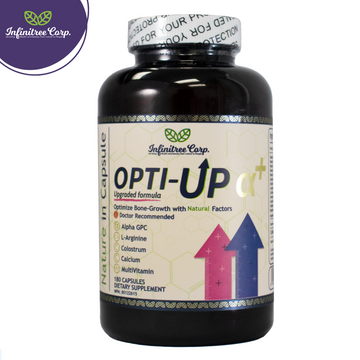
Hidden Nutritional Deficiencies That Could Be Slowing Your Child’s Growth
InfinitreeEditor.Jo
Hidden Nutritional Deficiencies That Could Be Slowing Your Child’s Growth
A Growth Concern That Took Me by Surprise
A few months ago, I noticed my son wasn’t growing as fast as his peers. He was eating well—at least, I thought so. He had three meals a day, plenty of snacks, and he wasn’t a particularly picky eater. But something wasn’t right. A visit to the pediatrician revealed the issue: hidden nutritional deficiencies.
Even though he was eating enough food, he wasn’t getting enough of the right nutrients to support bone development, muscle growth, and overall health. It turns out, many parents face this same hidden challenge.
Could your child’s growth be affected by nutrient gaps in their diet? Let’s dive into the key deficiencies that could be holding them back—plus easy ways to fix them!
Hidden Nutrient Gaps in a Child’s Diet
Many parents assume their child is getting enough nutrients because they eat a variety of foods. However, modern diets, food processing, and picky eating habits can lead to subtle deficiencies that aren’t immediately obvious. Some key signs include:
- Slower height or weight gain compared to their peers.
- Fatigue and low energy levels.
- Frequent illnesses or weak immunity.
- Weak bones, muscle cramps, or slow wound healing.
Even if a child appears healthy, they could be missing key vitamins and minerals that support optimal growth.
The Science: Key Nutritional Deficiencies That Impact Growth
Here are the most common deficiencies that can affect a child’s height, bone strength, and overall development.
1. Vitamin D – The “Sunshine Vitamin” for Bone Growth
Why It’s Important:
- Essential for calcium absorption and strong bones.
- A deficiency can lead to weaker bones, slower height growth, and increased risk of fractures.
Why Kids May Not Get Enough:
- Less outdoor play (reduced sun exposure).
- Diets low in fatty fish, eggs, and fortified dairy.
How to Fix It:
- Encourage at least 20-30 minutes of outdoor play daily for natural Vitamin D from sunlight.
- Add Vitamin D-rich foods like salmon, egg yolks, and fortified milk to their diet.
- Consider a Vitamin D supplement if recommended by a doctor.
2. Calcium – The Building Block of Strong Bones
Why It’s Important:
- Works with Vitamin D to build bone density and support height growth.
- A deficiency can lead to weaker bones, poor posture, and slower growth rates.
Why Kids May Not Get Enough:
- Low dairy consumption (common in kids with lactose intolerance).
- Preference for processed foods over whole foods.
How to Fix It:
- Include calcium-rich foods like milk, cheese, yogurt, leafy greens, and almonds.
- Use fortified plant-based milk (almond, soy, oat) for dairy-free kids.
- Ensure a balance of calcium and Vitamin D for proper absorption.
3. Zinc – The Growth-Boosting Mineral
Why It’s Important:
- Plays a key role in cell growth, immune function, and hormone production.
- A deficiency can cause slower height and weight gain, poor appetite, and weak immunity.
Why Kids May Not Get Enough:
- Processed food diets lack natural sources of zinc.
- Poor absorption due to gut health issues.
How to Fix It:
- Add zinc-rich foods like lean meats, beans, nuts, seeds, and whole grains.
- If your child is a picky eater, consider a zinc-fortified supplement.
4. Iron – Energy and Oxygen for Growth
Why It’s Important:
- Essential for oxygen transport in the blood and energy production.
- A deficiency can lead to fatigue, pale skin, slow growth, and weakened immunity.
Why Kids May Not Get Enough:
- Diets low in red meat, leafy greens, and iron-fortified cereals.
- Poor absorption from plant-based diets (iron from plants is harder to absorb).
How to Fix It:
- Include iron-rich foods like lean beef, chicken, spinach, lentils, and eggs.
- Pair plant-based iron sources with Vitamin C-rich foods (e.g., spinach + oranges) for better absorption.
5. Magnesium – The Overlooked Mineral for Growth and Recovery
Why It’s Important:
- Helps with bone strength, muscle recovery, and sleep regulation.
- A deficiency can cause muscle cramps, restlessness, and slow recovery after physical activity.
Why Kids May Not Get Enough:
- Magnesium-rich foods like nuts, seeds, and whole grains are often missing from kids’ diets.
How to Fix It:
- Add magnesium-rich foods like almonds, cashews, bananas, and whole grains.
- Encourage a balanced diet with a variety of whole foods rather than processed snacks.
The Solution: A Growth-Optimized Diet for Kids
To fill in nutritional gaps, focus on a diet that includes:
✅ Protein: Lean meats, fish, eggs, beans, tofu.
✅ Healthy Fats: Avocados, nuts, seeds, olive oil.
✅ Complex Carbs: Whole grains, sweet potatoes, quinoa.
✅ Fruits & Veggies: A colorful variety for vitamins and antioxidants.
✅ Fermented Foods: Yogurt, kefir, and kimchi for better gut health.
Putting It All Together: A One-Week Growth Meal Plan
Monday: Scrambled eggs + whole-grain toast + spinach smoothie.
Tuesday: Greek yogurt + nuts + banana.
Wednesday: Grilled chicken + quinoa + roasted broccoli.
Thursday: Oatmeal with seeds + berries + fortified almond milk.
Friday: Salmon + sweet potato + mixed greens.
Saturday: Stir-fry tofu + brown rice + kimchi.
Sunday: Whole-wheat pancakes with nut butter + orange juice.
By following a balanced and nutrient-rich meal plan, you can ensure your child is getting the essential vitamins and minerals they need to grow.
Tips for Preventing Nutritional Deficiencies
✔ Rotate Foods Regularly – A variety of foods prevents nutrient gaps.
✔ Limit Processed Foods – Prioritize whole, unprocessed foods.
✔ Encourage Hydration – Water helps with nutrient absorption.
✔ Get Regular Checkups – Growth tracking helps identify deficiencies early.
✔ Consider Supplements – If needed, opt for high-quality multivitamins.
Conclusion: Give Your Child the Best Start for Growth
Nutritional deficiencies can be hidden but impactful—affecting your child’s height, energy, and immune system. By ensuring a well-balanced diet rich in essential vitamins and minerals, you can support optimal growth and development.
Pairing a nutritious diet with a high-quality growth-supporting supplement like Opti-up Alpha Plus can further ensure your child gets the nutrients they need. Let’s help them grow stronger, healthier, and more energized every day!
Disclaimer: This article is for informational purposes only and does not constitute medical advice. Please consult your healthcare provider before making significant dietary changes or introducing new supplements to your child’s routine.






